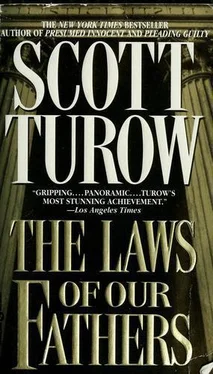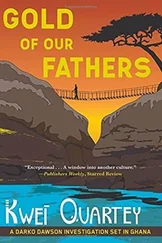Scott Turow - The Laws of our Fathers
Здесь есть возможность читать онлайн «Scott Turow - The Laws of our Fathers» весь текст электронной книги совершенно бесплатно (целиком полную версию без сокращений). В некоторых случаях можно слушать аудио, скачать через торрент в формате fb2 и присутствует краткое содержание. Жанр: Криминальный детектив, на английском языке. Описание произведения, (предисловие) а так же отзывы посетителей доступны на портале библиотеки ЛибКат.
- Название:The Laws of our Fathers
- Автор:
- Жанр:
- Год:неизвестен
- ISBN:нет данных
- Рейтинг книги:5 / 5. Голосов: 1
-
Избранное:Добавить в избранное
- Отзывы:
-
Ваша оценка:
- 100
- 1
- 2
- 3
- 4
- 5
The Laws of our Fathers: краткое содержание, описание и аннотация
Предлагаем к чтению аннотацию, описание, краткое содержание или предисловие (зависит от того, что написал сам автор книги «The Laws of our Fathers»). Если вы не нашли необходимую информацию о книге — напишите в комментариях, мы постараемся отыскать её.
The Laws of our Fathers — читать онлайн бесплатно полную книгу (весь текст) целиком
Ниже представлен текст книги, разбитый по страницам. Система сохранения места последней прочитанной страницы, позволяет с удобством читать онлайн бесплатно книгу «The Laws of our Fathers», без необходимости каждый раз заново искать на чём Вы остановились. Поставьте закладку, и сможете в любой момент перейти на страницу, на которой закончили чтение.
Интервал:
Закладка:
'I believe this decision is unwarranted,' he said at last, when I told him I had no choice now about Canada. 'There are alternatives.'
'Such as?'
‘I have the name of a doctor. He is conversant apparently with all the regulations.'
'Oh great. I'm going to bribe some MD to find something wrong with me. Is that the idea?'
'The idea is this man feels as you do and will assist you.'
'Oh sure. What other ideas have you got?' I imagined that my mother had rushed him straight to the phone as soon as he came in from work, still in his heavy wool suit. Beside him stood his briefcase, which, as a child, I had improbably associated with a cowboy's saddle bags.
'I have talked with Harold Blossman. He tells me his son has joined the Naval Reserve. There is some period of training, then you are free to go on your way. Write movies, whatever.'
'And what happens if you get called up?'
'Called up?'
'You know, they activate your unit. Then when you run away they call it treason.' 'Apparently that is rare.' 'And if it happens?'
'Then you confront the matter at that time, Seth. Dear God, you cannot make plans for the rest of your life concerning a matter of this sort.'
This talk of compromise, difficult to counter, tended to terrify me. In my passionate disapproval of the war, I had found one thing – perhaps the only thing – which I knew to be right and which was thoroughly mine. To believe so strongly and not to act on it, to capitulate to my parents' needs, was to condemn myself to a murk in which I'd never find my own outline.
'I'm against this. You don't understand. I'm against this war machine. I want to resist. I don't want to just skate through so that some Puerto Rican kid from the North End can go die for me. I don't want to pretend I'll serve and let them torture me in basic training and then run away if they're going to ship me out to Nam. It's another form of involuntary servitude, to go fight the war that the defense contractors want. There is one alternative.'
'This is not an alternative.'
'Dad, this is the kind of thing that has to be fought. I would think you'd understand that.' I knew this was a vain argument. My father and I agreed that there were lessons in history, but not about who was who. He scoffed at the parallels I drew between our national government and Germany in the thirties. It was the students at Columbia whom my father compared to the beer-hall putsch; the Panthers, in his eyes, were the brownshirts with berets.
'Your mother would feel that her life had come to nothing,' he finally said. 'You should have some feeling for her. I do not need to remind you.' As I had gotten older, my conflicts with my father were all supposedly conducted for her sake. What he wanted, did not want, was never purportedly in his own behalf. He was her spokesman, her defender. I begged him not to start with that.
'And Hobie?' my father asked. 'What will he do? Will he run away with you?' My father and Hobie always had a peculiar kinship, on some weird wavelength of their own. My father had the usual Viennese snob's appreciation for high intellect, and he listened to Hobie's smart remarks with a dry, approving smile he never found for me. When I told him that Hobie had pulled a high number, he sounded relieved. 'So you will take this step alone,' he pointed out. 'And when is that?' 'I don't know. Not for a while.' 'I see. We can hope then for your better senses, can we not?' I did not answer. Sonny had come in by then and she stood tensely listening to the conclusion of my conversation. I looked to her as I cradled the phone.
' "Zere are alternatifs," ' I said, mocking my father's accent. I had made fun of both my parents this way all my life, even to their faces, never quite focusing on why this teasing was acceptable to them. Yet it was always vital to my parents that I be genuinely American, fully at home here – and secure. They spoke English whenever I was around, and had even given me a name which to my enduring puzzlement neither of them could correctly pronounce. I was 'Set' in my mother's Czech accent, 'Sess' to my father. This passionate desire of theirs that I fit in was my sole avenue of escape in a home where my father's humorless correctness and my mother's anxieties left me little other refuge. My claim that something was 'American' – cap guns, when I was six; watching too much TV; my irregular sense of humor – almost invariably caused them to yield. Which, in large part, was why so much seemed to be at stake in my decision to leave the United States.
'Did he have any new ideas?' Sonny asked.
'Zip,' I responded. In truth, there were other courses that fit my moral regimen. I could go underground. False IDs – especially a social security number – were needed, but it was really life on the run, with the constant anxiety of apprehension, that seemed impossible to me. There was also the more noble alternative of accepting prosecution. Brad Kolaric, a fellow I knew at Easton, had done it and was now in the federal penitentiary at Terre Haute. But the prison butt-fuck stories kept me up at night, and I didn't feel my government should be imprisoning me for its errors. Exile seemed my only alternative.
'Maybe I can trade myself for Juanita Rice. Maybe the Gypsies would kidnap me. Carry me away with them. My mother always told me how they snatch children.'
Sonny had heard the same from her Aunt Hen.
'You think they have an age limit?' I asked.
'They might.'
'Shit. I thought I had the solution. They could take me to Canada.' I looked at Sonny. 'It's such a down,' I told her. 'There's no answer, baby.' 'Kidnapping,' I said.
Sonny gave me a melancholy smile. 'I don't think so.'
'Hey, look, I know what bothers me. It's not Canada really. It's deserting them. That's the way they see it. If they knew I was safe in a real nice country but being held against my will -' I shot out a hand: smooth sailing. More than the government, what I needed to escape was my parents' unspoken condemnation -that I would dare forget what was never to be forgotten.
No doubt, that night I dreamt about the numbers. Frail figures, they turned up in my dreams throughout my childhood, usually appearing to my horror somewhere on my body: under a trouser cufF, in the center of my forehead when I caught sight of myself in a mirror. Unlike my father, who wore long sleeves on all occasions, even in the mug of summer, who, so far as I can recall, never swam in public – unlike him, my mother made no exceptional efforts to hide the blue-green characters tattooed on her forearm, a few inches above her wrist. The marks, so distinct, were always remarkable to me – ineradicable and vaguely disfiguring, but dear and special because they were so identifiably hers. I can recall more than one occasion when I was very young when I wet a finger from my mouth and with no objection from her tried to wipe the numerals away. When I asked what they were, she said simply – always – 'Those? Those are numbers.' And when I wrote numbers – scribbles, really – on myself in pen, she walked me to the sink at once.
As I learned to read, I remember noticing that the figures were peculiarly formed – hand-drawn in a style that struck me as foreign. There were tails of some sort on the fives and a dash across the middle of the seven. And around this age I began, at last, in some awful unspeaking way, to associate the numbers with that large, indescribable horror, that dark fog that lay somewhere in the past which was always the subject of silent allusion in my parents' home.
My father never allowed any talk about the camps. If something appeared on TV, he watched it with unwavering silent attention. But he made no mention on his own and would discourage my mother with stark looks. And yet the few images I saw – of the naked skeletal bodies, the cyanotic corpses stacked and so profoundly without life – endured as specters. They lived with me inalterably, part of the high tension of my household, which had an atmosphere at all times like a tautened instrument string waiting to be plucked.
Читать дальшеИнтервал:
Закладка:
Похожие книги на «The Laws of our Fathers»
Представляем Вашему вниманию похожие книги на «The Laws of our Fathers» списком для выбора. Мы отобрали схожую по названию и смыслу литературу в надежде предоставить читателям больше вариантов отыскать новые, интересные, ещё непрочитанные произведения.
Обсуждение, отзывы о книге «The Laws of our Fathers» и просто собственные мнения читателей. Оставьте ваши комментарии, напишите, что Вы думаете о произведении, его смысле или главных героях. Укажите что конкретно понравилось, а что нет, и почему Вы так считаете.












